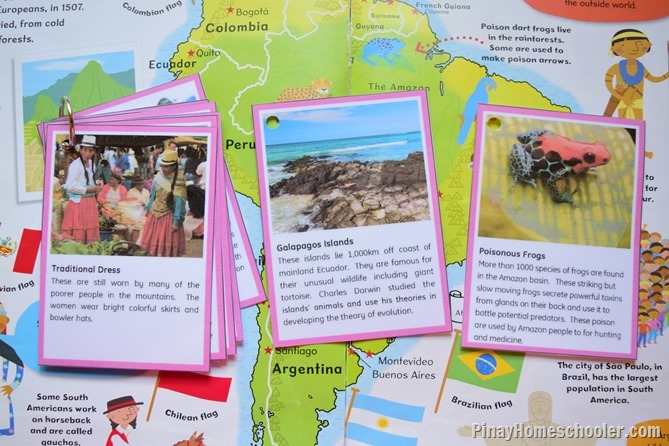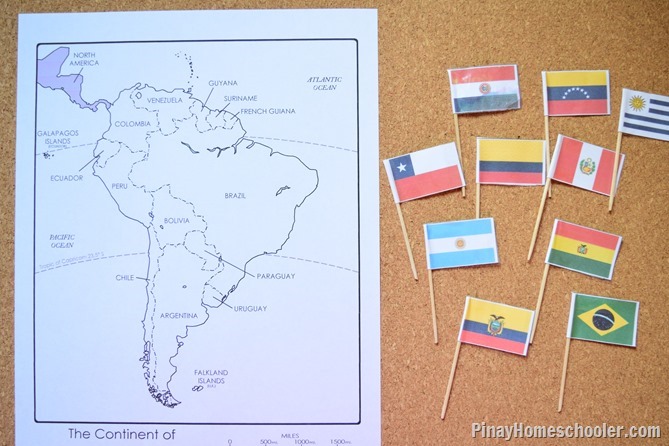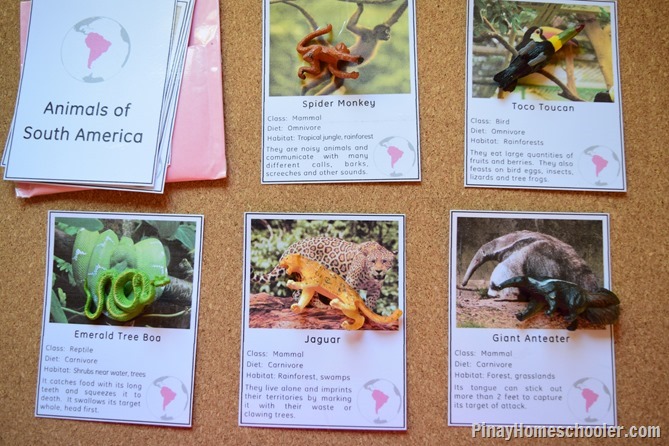*** Contain affiliate links
Map and Flags. Whenever we worked a geography lesson at home(for elementary only!), I always start with maps and flags because I wanted him to memorize the location and flags of certain cities from that continent. We travel a lot, crossing countries and continents almost every year and so knowing all these is really important. The Montessori Continent Puzzle is from Tower High Learning.
Pinning flags in the map is an activity Mavi loves since we started geography year ago. I printed the map from Super Teacher and used our pin maps from South American Flags (pin maps, 3 part cards, mini flags and all).
Landmarks. We identified the famous landmarks of South America and their location on the map. I also showed Mavi some photos of my Dad (Mavi’s grandfather) in Brazil when he visited Christ the Redeemer. Mavi was fascinated that his grandfather reached South America during his travels!
Galapagos Islands and its animals. Using the Safari Toobs Galapagos, we talked about the unique animals that inhabit the islands. I created identification cards (as reading materials for Mavi) so he will learn what makes those animals unique.
Animals and their Habitats. I love talking about animals and their habitats. My Mavi has always been fascinated with at different animals living in each continent. To start off, we review the different animals living in South America, these cards are from my South American Animals. There’s so much information from these cards, like it indicates the class of the animal (mammal, reptile, bird etc), the habitat in which they thrive and the kind of foods they eat. We also matched them with our animal figures from Safari Toob Rainforest.
We also talked about the colourful animal coverings and patterns of the South American animals and compared them to those in Africa. Just by looking at the animals’ coverings, you will know in which habitat they thrive. Most colourful animals like that of Macaw birds and poisonous frogs lives in rainforests, while those that are grayish, thrives in deserts.
Because we looked into the animals of South America, we examined the green iguana which mostly lives in that continent. We haven’t worked on reptiles before, so this was a good start of learning the different parts of a reptile and differentiate it from birds, fish, frogs and mammals.
Plants. Talking about habitats led us to discuss plants of South America. These plants mostly grow in the tropical areas of the continent and the cold mountains of Andes. These cards are from the Plant Atlas.
Culture. I’ve collected important fact about South America and included it in our learning cards for our South America in a Nutshell. These cards are for older children who love to read and learn about the culture, lifestyle and religion of the people of South America. 
The cards provide information how people dress up, what foods they eat, the products they export to other countries and the richness of each South American countries.
Because South America has brought us dances like Tango and Samba, Mavi and I watched a few videos online to see how these dances are being performed.
We also watched the festivals celebrated in South America, like the Tango Festival and the Carnaval in Brazil.
Other materials that we used are the following:
Natural Resources of the World – information about the different natural resources found in each continent.
Animal Habitats – contains collection of animals that thrive in the different biomes of the world.
Major Rivers of the World – pictures and facts cards of the longest and most important rivers of each continent.
Another fantastic geography lesson we had early this year was the study of Africa. Click here or the image below for ideas and list of activities
And don’t forget to pin this for later! You will definitely be needing this!
Learning materials used:












I just love your continent studies! They are always so wonderful and full of great ideas and inspiration. The pictures turned out beautiful!
ReplyDeleteThank you! I love putting up geography studies :)
ReplyDelete